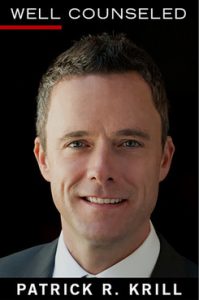Progress, Not Perfection, Is Key to Law Firms' Mental Health Programs
Do we have a very long way to go? Of course. But it is imperative that we don't allow our collective perfectionism or skepticism to become the enemy of the good by minimizing gains made.
June 12, 2019 at 12:30 PM
6 minute read

 An unprecedented focus on well-being has emerged within the legal profession over the last several years, driven largely by issues related to mental health and substance misuse.
An unprecedented focus on well-being has emerged within the legal profession over the last several years, driven largely by issues related to mental health and substance misuse.
I've spent the last decade researching, writing and advocating in the hopes of fueling the very well-being "movement" now underway, so it is no surprise that I am gratified and legitimately optimistic about the progress the legal profession is making around a centrally important and long-overlooked subject.
Unfortunately, not everyone in the profession shares my optimism. But they should.
To begin, let's take a jaunt down memory lane to gain some perspective. Three and a half short years ago, the discussion around the mental health and well-being of lawyers and law students was so muted as to be imperceptible. Outside of those on the "front lines" in a clinical, academic or regulatory sense, there was what could charitably be described as a slim minority of the profession that was passionately—or even discernibly—focused on how its people were doing. As Yoda might have put it, mainstream well-being was not. Fringe it did seem.
 Fast-forward to 2019, and my how things have changed. When you stop to consider the following examples of progress and change that have occurred in that time, it would be hard to credibly say otherwise: We now have a better understanding of the actual challenges we face, thanks to the availability of seminal research on lawyer and law student behavioral health and the report of the National Task Force on Lawyer Well-being.
Fast-forward to 2019, and my how things have changed. When you stop to consider the following examples of progress and change that have occurred in that time, it would be hard to credibly say otherwise: We now have a better understanding of the actual challenges we face, thanks to the availability of seminal research on lawyer and law student behavioral health and the report of the National Task Force on Lawyer Well-being.
In addition, dozens of state bar associations have formed their own task forces on well-being. More than one-hundred large legal employers have signed on to the ABA Well-being Pledge and have begun to implement its framework. Also, legal media outlets are devoting significant resources and bandwidth to regular and ongoing coverage of mental health and well-being. At the same time, a growing and impressive number of individuals have been willing to publicly share their own personal struggles in order to challenge the stigma around addiction and mental health.
More improvements include changes to CLE requirements, bar admission applications and law school curricula across the country. Well-being topics are now regularly included on the agendas of most legal industry conferences, bar association annual meetings, and law firm retreats. I could go on, but this column has a word limit. Any objective and informed evaluation of that progress would seemingly have to conclude that it is, at an absolute minimum, quite good.
Do we have a very long way to go? Of course. Is there still, metaphorically speaking, a huge canyon between where the profession is now and where we might otherwise want it to be? Yes, and the solution to that is to keep building—plank by plank—a bridge to the other side. Standing on the edge while complaining about the width of the chasm won't do anything to narrow its yawn, so we shouldn't overindulge the temptation to do so.
In that vein, it is imperative that we don't allow our collective perfectionism or skepticism to become the enemy of the good by minimizing gains made, or by dismissing anything less than immediate and wholesale cultural overhaul as an unworthy failure, disingenuous lip service, or mere window-dressing on the profession's irredeemable flaws.
Unfortunately, too many lawyers seem comfortable doing just that, in a sense saying "Yeah, yeah, come back when you've when dismantled the business model of law firms or abolished the billable hour. Then we'll talk about well-being." In doing so, people of this mindset are ignoring everything we know about how sustainable cultural change is facilitated, which is often steadily and incrementally.
They are also failing to do their part. Frequently convinced that anything short of utter transformation of the profession will amount to meaningless improvements in lawyer mental health, these individuals are generally indulging negativity and defeatism while masquerading as realists, unintentionally mounting a de facto defense of the status quo that makes them more a part of the problem than the solution. Don't be that person.
Now look, I get it, lawyers tend to be perfectionists and skeptics by nature, and you could argue that those traits are grafted onto our DNA by the time we emerge from law school. We want and expect perfection and still doubt and question that it would be good enough. When it comes to well-being, however, both at the macro and micro level, perfectionism and skepticism are inherently unhelpful and self-defeating qualities. How they are at odds with well-being on a micro level is an interesting, important and probably intuitive conversation for another time. How they are harmful on the macro level is what concerns me more.
If we are going to maintain and build upon the meaningful progress we've already experienced around making mental health and well-being mainstream priorities for the legal profession, we need to continue pursuing tangible, manageable and strategic improvements that are both realistic and thoughtful. Nebulous calls for aggressive culture change, paradigm shifts or overhauls that aren't based in practical reality will not get us where we need to be, and important allies will be lost to a contagion of discouragement, intransigence and resignation along the way.
The beckoning of an undefined nirvana may be powerful, and the impulse to reject anything short of that perfection reflexive, but let's all do our part and not succumb. It's often said that a journey of a thousand miles begins with single step. Hopefully we can all agree that critiquing the length of that stride is missing the point entirely.
Read more: Minds Over Matters: An Examination of Mental Health in the Legal Profession.
Patrick Krill is the founder of Krill Strategies, a behavioral health consulting firm focused exclusively on the legal industry. Go to www.prkrill.com for more information. He is also a member of Law.com's Minds Over Matters advisory board.
This content has been archived. It is available through our partners, LexisNexis® and Bloomberg Law.
To view this content, please continue to their sites.
Not a Lexis Subscriber?
Subscribe Now
Not a Bloomberg Law Subscriber?
Subscribe Now
NOT FOR REPRINT
© 2025 ALM Global, LLC, All Rights Reserved. Request academic re-use from www.copyright.com. All other uses, submit a request to [email protected]. For more information visit Asset & Logo Licensing.
You Might Like
View All
Change Is Coming in the Trump Era. For Big Law, Change Is Already Here
6 minute read

'If the Job Is Better, You Get Better': Chief District Judge Discusses Overcoming Negative Perceptions During Q&A

The Growing Antitrust Scrutiny of DraftKings and FanDuel
Trending Stories
- 1Departing Attorneys Sue Their Former Law Firm
- 2Pa. High Court: Concrete Proof Not Needed to Weigh Grounds for Preliminary Injunction Order
- 3'Something Else Is Coming': DOGE Established, but With Limited Scope
- 4Polsinelli Picks Up Corporate Health Care Partner From Greenberg Traurig in LA
- 5Kirkland Lands in Phila., but Rate Pressure May Limit the High-Flying Firm's Growth Prospects
Who Got The Work
J. Brugh Lower of Gibbons has entered an appearance for industrial equipment supplier Devco Corporation in a pending trademark infringement lawsuit. The suit, accusing the defendant of selling knock-off Graco products, was filed Dec. 18 in New Jersey District Court by Rivkin Radler on behalf of Graco Inc. and Graco Minnesota. The case, assigned to U.S. District Judge Zahid N. Quraishi, is 3:24-cv-11294, Graco Inc. et al v. Devco Corporation.
Who Got The Work
Rebecca Maller-Stein and Kent A. Yalowitz of Arnold & Porter Kaye Scholer have entered their appearances for Hanaco Venture Capital and its executives, Lior Prosor and David Frankel, in a pending securities lawsuit. The action, filed on Dec. 24 in New York Southern District Court by Zell, Aron & Co. on behalf of Goldeneye Advisors, accuses the defendants of negligently and fraudulently managing the plaintiff's $1 million investment. The case, assigned to U.S. District Judge Vernon S. Broderick, is 1:24-cv-09918, Goldeneye Advisors, LLC v. Hanaco Venture Capital, Ltd. et al.
Who Got The Work
Attorneys from A&O Shearman has stepped in as defense counsel for Toronto-Dominion Bank and other defendants in a pending securities class action. The suit, filed Dec. 11 in New York Southern District Court by Bleichmar Fonti & Auld, accuses the defendants of concealing the bank's 'pervasive' deficiencies in regards to its compliance with the Bank Secrecy Act and the quality of its anti-money laundering controls. The case, assigned to U.S. District Judge Arun Subramanian, is 1:24-cv-09445, Gonzalez v. The Toronto-Dominion Bank et al.
Who Got The Work
Crown Castle International, a Pennsylvania company providing shared communications infrastructure, has turned to Luke D. Wolf of Gordon Rees Scully Mansukhani to fend off a pending breach-of-contract lawsuit. The court action, filed Nov. 25 in Michigan Eastern District Court by Hooper Hathaway PC on behalf of The Town Residences LLC, accuses Crown Castle of failing to transfer approximately $30,000 in utility payments from T-Mobile in breach of a roof-top lease and assignment agreement. The case, assigned to U.S. District Judge Susan K. Declercq, is 2:24-cv-13131, The Town Residences LLC v. T-Mobile US, Inc. et al.
Who Got The Work
Wilfred P. Coronato and Daniel M. Schwartz of McCarter & English have stepped in as defense counsel to Electrolux Home Products Inc. in a pending product liability lawsuit. The court action, filed Nov. 26 in New York Eastern District Court by Poulos Lopiccolo PC and Nagel Rice LLP on behalf of David Stern, alleges that the defendant's refrigerators’ drawers and shelving repeatedly break and fall apart within months after purchase. The case, assigned to U.S. District Judge Joan M. Azrack, is 2:24-cv-08204, Stern v. Electrolux Home Products, Inc.
Featured Firms
Law Offices of Gary Martin Hays & Associates, P.C.
(470) 294-1674
Law Offices of Mark E. Salomone
(857) 444-6468
Smith & Hassler
(713) 739-1250








